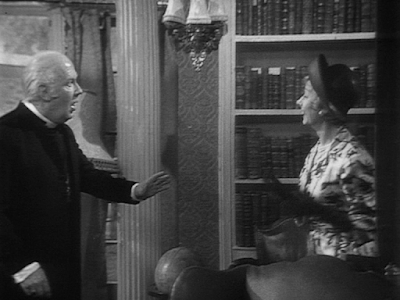Unfortunately this isn't one of those
memorable episodes concerned with cruelly thwarting Timothy Lumsden's personal
development. It’s a less interesting farce today, with an escaped prisoner
hiding in the house while Timothy's parents entertain a senior policeman and
his wife.
For bang-on mid-to-late eighties period specificity, the Lumsdens have joined a Neighbourhood Watch scheme. This was a social development that comedy screenwriters quickly latched on to at the time, creating an uncontrived reason for policemen to socialise with characters in a domestic setting, and generating new opportunities for busybody characters to behave officiously and hilarious misunderstandings to occur. The episode of Ever Decreasing Circles is probably the best of these storylines, but there was even a whole series on the theme in 1988, Wyatt's Watchdogs.
Another period-specific detail, but one that lasted throughout the seventies and eighties is a prisoner complaining that, "I thought you were Lord Longford coming to visit!"
For bang-on mid-to-late eighties period specificity, the Lumsdens have joined a Neighbourhood Watch scheme. This was a social development that comedy screenwriters quickly latched on to at the time, creating an uncontrived reason for policemen to socialise with characters in a domestic setting, and generating new opportunities for busybody characters to behave officiously and hilarious misunderstandings to occur. The episode of Ever Decreasing Circles is probably the best of these storylines, but there was even a whole series on the theme in 1988, Wyatt's Watchdogs.
Another period-specific detail, but one that lasted throughout the seventies and eighties is a prisoner complaining that, "I thought you were Lord Longford coming to visit!"




















